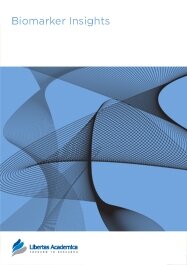

Publication Date: 12 Mar 2008
Journal: Biomarker Insights
Citation: Biomarker Insights 2008:3 101-113

1Department of Immunology. Fundación Jiménez Díaz, Madrid, Spain. 2Department of Biochemistry and Molecular Biology I, Universidad Complutense, Proteomic Unit, Madrid, Spain. 3Department of Cardiology. Hospital Virgen de la Salud, SESCAM, Toledo, Spain. 4Department of Vascular Pathophysiology. Hospital Nacional de Paraplejicos, SESCAM, Toledo, Spain.
Abstract
Biomarkers provide a powerful approach to understanding the spectrum of cardiovascular diseases. They have application in screening, diagnostic, prognostication, prediction of recurrences and monitoring of therapy. The “omics” tool are becoming very useful in the development of new biomarkers in cardiovascular diseases. Among them, proteomics is especially fitted to look for new proteins in health and disease and is playing a significant role in the development of new diagnostic tools in cardiovascular diagnosis and prognosis. This review provides an overview of progress in applying proteomics to atherosclerosis. First, we describe novel proteins identified analysing atherosclerotic plaques directly. Careful analysis of proteins within the atherosclerotic vascular tissue can provide a repertoire of proteins involved in vascular remodelling and atherogenesis. Second, we discuss recent data concerning proteins secreted by atherosclerotic plaques. The definition of the atheroma plaque secretome resides in that proteins secreted by arteries can be very good candidates of novel biomarkers. Finally we describe proteins that have been differentially expressed (versus controls) by individual cells which constitute atheroma plaques (endothelial cells, vascular smooth muscle cells, macrophages and foam cells) as well as by circulating cells (monocytes, platelets) or novel biomarkers present in plasma.
PDF (245.55 KB PDF FORMAT)
RIS citation (ENDNOTE, REFERENCE MANAGER, PROCITE, REFWORKS)
BibTex citation (BIBDESK, LATEX)
PMC HTML

I would like to extend my gratitude for creating the next generation of a scientific journal -- the science journal of tomorrow. The entire process bespoke of exceptional efficiency, celerity, professionalism, competency, and service.

All authors are surveyed after their articles are published. Authors are asked to rate their experience in a variety of areas, and their responses help us to monitor our performance. Presented here are their responses in some key areas. No 'poor' or 'very poor' responses were received; these are represented in the 'other' category.See Our Results
Copyright © 2014 Libertas Academica Ltd (except open access articles and accompanying metadata and supplementary files.)
Facebook Google+ Twitter
Pinterest Tumblr YouTube